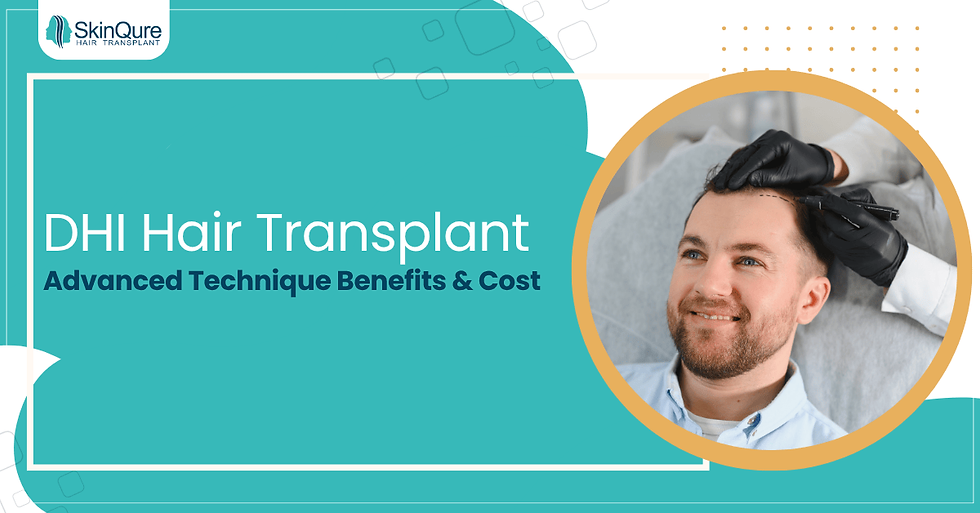What to Expect After 15 Days of Hair Transplant Surgery?
- Dr Jangid, MD
- May 8, 2024
- 3 min read

At SkinQure, we understand the profound impact that hair loss can have on your confidence and self-esteem. That's why we're committed to guiding you through every step of your hair transplant journey, including the crucial recovery period. As you approach the 15-day mark after your procedure, it's essential to know what to expect to ensure a smooth and successful recovery process.
Let's explore the journey ahead and provide you with insights into what lies ahead 15 days after your hair transplant. But first, we will also give you a glimpse of what happens during a hair transplant. Read on!
What is a Hair Transplant & what happens during this procedure?
A hair transplant is a surgical procedure to address hair loss by moving hair follicles from a donor area to a balding or thinning area. During the procedure, hair follicles are either harvested as a strip (FUT) or individually (FUE) and then implanted into recipient sites on the scalp. The recipient sites are prepared with tiny incisions, and the follicles are placed to mimic natural hair growth patterns. Local anesthesia is used for comfort, and post-operative care includes instructions for scalp care and follow-up appointments.
Let us Help you Understand the Recovery Process from Day 1 to Day 15th
The days following your hair transplant are vital for optimal results. Here's a detailed overview of what you can expect during the 15-day recovery period, as per our expert hair transplant surgeon in Delhi, Dr. Jangid.
Days 1 to 3
You may experience some discomfort, pain, and swelling in the scalp area immediately after the procedure.
Follow the post-operative care instructions provided by your SkinQure specialist diligently, including taking prescribed medications and avoiding direct sunlight exposure.
It's normal to experience mild headaches and irritation during this initial phase.
Days 4 to 6
Scabs or crusts may develop in the treated area, serving as protective barriers for the newly implanted grafts.
Avoid shampooing your hair during this time, but ensure gentle cleansing with the recommended hair care products provided by your SkinQure specialist.
Refrain from engaging in strenuous activities or heavy lifting to promote optimal healing.
Days 7 to 9
You may notice scalp itchiness and sweating, but resist the urge to scratch or pick at the treated area to prevent potential damage to the grafts.
Avoid intense physical exercises, smoking, and alcohol consumption as advised by your SkinQure specialist.
By day 9, you can typically resume shampooing your hair using the prescribed products, and you may observe increased security of the hair grafts.
Days 10 to 11
The red scabs on the treated area will gradually begin to disappear, indicating progress in the healing process.
Exercise caution when removing scabs to minimize the risk of follicular damage.
Expect the hair grafts to become more securely anchored in place between days 10 and 14.
Days 12 to 15
By the fifteenth day, most, if not all, of the crusting should have vanished, allowing for gentle shampooing to clear any remaining scabs.
Adhering to proper post-operative care practices is crucial to promote healthy hair growth and ensure optimal results.
What to Expect During Recovery?
While the recovery timeline may vary depending on the type of hair transplant procedure you underwent, common side effects within the initial weeks may include slight tingling or numbness in the scalp. Patients who underwent follicular unit extraction (FUE) may typically resume regular activities by day 14, while those who underwent follicular unit transplantation (FUT) may require additional time for recovery. It's essential to remain vigilant for any signs of infection or unusual symptoms and to contact your SkinQure specialist if you have any concerns.
Frequently Asked Questions
How to prevent infection after the surgery?
Maintain scalp hygiene to minimize the risk of infection during the healing period, as advised by your SkinQure specialist.
What are the guidelines to Using a Comb?
Patients may use a comb around the fifteenth day for faster recovery, while those with slower healing may need to wait a few more days.
What is Shock Hair Loss?
This is a common occurrence post-transplantation due to trauma experienced during the surgery. It's usually temporary and resolves over time.
What are the precautions for the initial 2 weeks?
Patients may experience sleeping difficulties, swelling, pain, and irritation during the initial phase of recovery. However, these symptoms should gradually improve as the healing process progresses.
Conclusion
Understanding what to expect 15 days after your hair transplant is essential for a successful recovery. At SkinQure, we're here to support you every step of the way and provide personalized care to ensure optimal results. If you have any questions or concerns during your recovery journey, don't hesitate to reach out to our team of experts. After all, our hair transplant clinic in Delhi is one of the best. Your journey to restore confidence and a fuller head of hair begins here at SkinQure.








Comments